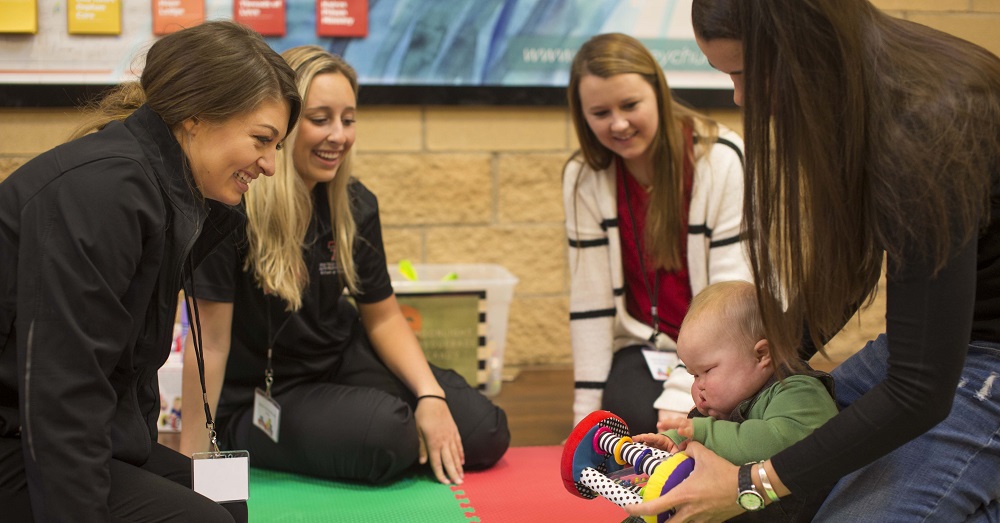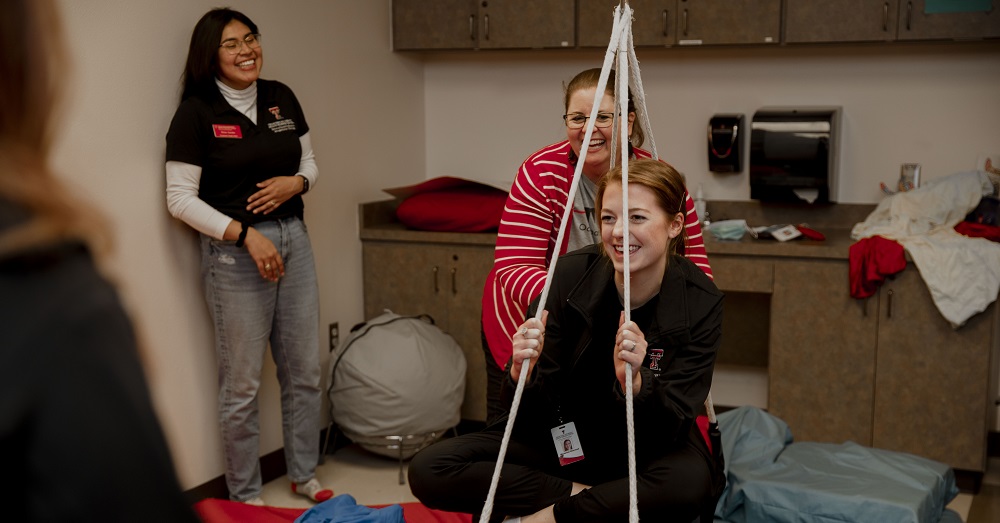World Down Syndrome Day
In Recognition of World Down Syndrome Day in March, We Discuss How TTUHSC is Training Occupational Therapists to Assess and Treat Patients With Down Syndrome.

OTs play a crucial role assessing and treating patients with Down syndrome
World Down syndrome Day is observed every year on March 21st. It was established to raise
awareness about Down syndrome and to promote inclusion and acceptance of people with Down syndrome in all aspects of society.
Occupational therapists play a crucial role in helping individuals with Down syndrome reach their full potential. We sat down with Cindi Tiongco, OTR, PhD, to discuss how occupational therapists (OTs) assess and treat patients with Down syndrome, and how TTUHSC is training OTs to enter this essential field.
Tiongco serves as an Assistant Professor in the Occupational Therapy Program of the TTUHSC School of Health Professions.
What is Down Syndrome?
Down syndrome is a genetic disorder that affects approximately one in every 700 babies born worldwide.
“Another name for Down syndrome is trisomy 21,” Tiongco begins. “That’s why [World
Down syndrome Day] is on 3/21 because individuals with Down syndrome have three copies
of chromosome 21.”
Down syndrome leads to a range of physical and intellectual differences. Children
with Down syndrome may experience delays in reaching milestones, including crawling,
walking and speaking.
How do Occupational Therapists Help Treat Children with Down Syndrome?

OTs help patients develop adaptive skills
Occupational therapists play a crucial role in helping individuals with Down syndrome reach their full potential. Occupational therapy is a type of therapy that focuses on improving a person's ability to carry out everyday activities. Occupational therapists work with individuals with Down syndrome to help them develop skills that are essential for independence and quality of life. These skills may include fine motor skills, gross motor skills, and self-care skills, such as dressing and eating.
“Sometimes, individuals with Down syndrome are born with different heart conditions, heart defects, or may have feeding and swallowing issues, or can be born with really low [muscle] tone,” Tiongco says. “In that case an OT might work with them in the neonatal intensive care unit, helping to support the team with feeding and setting that up right.”
She explains that Down syndrome is a condition where children receive early intervention services in order to facilitate development.
Occupational therapists also work with individuals with Down syndrome to develop adaptive skills, which are alternative ways of completing an activity more suited to their abilities. For example, an occupational therapist may teach a child with Down syndrome how to use a special utensil to eat if they have difficulty holding a fork or spoon. Occupational therapists also help individuals with Down syndrome develop social skills, such as taking turns.
In addition to working with individuals with Down syndrome, occupational therapists also collaborate with families, schools and other professionals to create a supportive environment. This may include recommending adaptations to the home and school environments, such as installing ramps or making adjustments to furniture, to ensure that individuals with Down syndrome have access to all areas.
Occupational Therapy at TTUHSC
The Occupational Therapy program at TTUHSC is an entry-level doctorate level program designed to prepare students for a successful career as an OT. Combining classroom instruction with hands-on clinical experience, the program is taught by experienced and knowledgeable faculty, who are dedicated to providing students with a comprehensive education that allows students to apply the theory they have learned in real-life situations.
Down syndrome is one of the many conditions that Occupational Therapists are trained to understand and treat. Tiongco is quick to point out that developmental milestones are reached at different points by different individuals.
“When you’ve met one person with Down syndrome, you’ve met one person with Down syndrome,” she says. “Number one, I help to train my students to get to know the individual correctly and be prepared with knowledge about a diagnosis, which is what we teach so that they can use their skills around assessing tone, developmental levels and fine motor skills.”
What Makes a Good Occupational Therapist?
Tiongco points out the value of a good sense of humor for becoming a good Occupational Therapist. She remembers one client in particular.
“Every time I saw him, he told me a dad joke, and so I had to really work on my game so I could give one back, right?” she says with a laugh. “It’s important to have that ability to recognize, to be really interested in recognizing people’s unique abilities and being able to roll with the punches and have that sense of humor.”
Furthermore, OTs provide support and advice for family members of patients as well, so that everyone can help to provide the accommodations and independence that their loved one needs to live their best life.
Related Stories
TTUHSC Receives $1 Million Gift from Amarillo National Bank to Expand and Enhance Pediatric Care in the Panhandle
TTUHSC School of Medicine leaders accepted a $1 million philanthropic gift from Amarillo National Bank on Tuesday (Feb. 10), marking a transformational investment in pediatric care for the Texas Panhandle.
Texas Tech University Health Sciences Center Permian Basin Announces Pediatric Residency Program Gift
TTUHSC Permian Basin, along with the Permian Strategic Partnership and the Scharbauer Foundation, Feb. 5 announced a gift that will fund a new pediatric residency.
The Ph.D. Programs that Shape Health Care
The Graduate School of Biomedical Sciences Ph.D. programs at TTUHSC provide the foundation, mentorship and research opportunities you need to pursue groundbreaking work.
Recent Stories
National Academy of Inventors Names TTUHSC Faculty Senior Members
The National Academy of Inventors (NAI) has designated two current and one former TTUHSC faculty researchers as Senior Members.
The John Wayne Cancer Foundation Surgical Oncology Fellowship Program at Texas Tech University Health Sciences Center Announced
TTUHSC is collaborating with the John Wayne Cancer Foundation and has established the Big Cure Endowment, which supports the university’s efforts to reduce cancer incidence and increase survivability of people in rural and underserved areas.
TTUHSC Receives $1 Million Gift from Amarillo National Bank to Expand and Enhance Pediatric Care in the Panhandle
TTUHSC School of Medicine leaders accepted a $1 million philanthropic gift from Amarillo National Bank on Tuesday (Feb. 10), marking a transformational investment in pediatric care for the Texas Panhandle.
